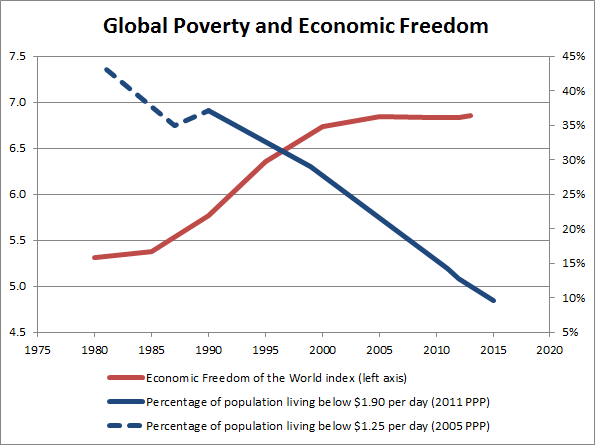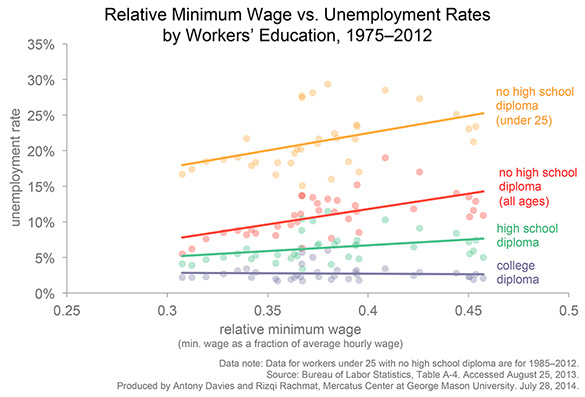Don’t Expand “Buy American,” End It
Written by Brian Garst, Posted in Economics & the Economy
Last Monday President Trump signed yet another “Buy American” Executive Order proposing significant changes for procurement rules. The EO encourages the Federal Acquisition and Regulatory (FAR) Council to expand the scope of the Buy American Act, a Hoover-era mandate that appeals to Trump’s mercantilist sensibilities, by making it more difficult for products to be classified as American made.
Enacting new standards to determine whether a product qualifies as “domestic” or “foreign,” if agreed to by FAR Council, could upend the supply chains of federal contractors. The EO order calls for the Eisenhower-era standards that consider a product to be “domestic” if more than 50% of the components (by cost) are of U.S. origin to be updated to a 55% requirement, and for the FAR Council to consider whether it should be increased over time until the requirement is for at least 75% U.S. components. However, it is also proposes a separate standard of 95% U.S. sourced components for iron and steel products. That’s a huge potential change for contractors
It matters whether a good is labeled “foreign” or “domestic” because the latter are given a “price evaluation preference,” where foreign sourced products are considered 6% (or 12% if the domestic competition is a small business) more expensive than they actually are. This means awarding contracts to firms with domestic source goods in some cases even when they are not offering the best price. Trump’s EO seeks to increase those price advantages from 6% to 20%, and from 12% to 30% for small businesses, potentially saddling taxpayers with much higher costs.
Cato’s Daniel Ikenson has previously explained the folly of “Buy American”:
When we artificially reduce the pool of qualified suppliers or the variety of eligible supplies that can satisfy procurement requirements, projects cost more, take longer to complete, and suffer from lower quality. Only a basic understanding of supply and demand is required to see that limiting competition for procurement projects ensures one outcome: taxpayers get a smaller bang for their buck.
Sure, some U.S. companies will win bids, hire new workers, and generate local economic activity. What will be less visible — but every bit as real — are the contracts denied numerous other U.S. businesses and workers because the resources have been stretched and depleted to satisfy restrictive procurement rules. Some U.S. companies and some U.S. workers may benefit, but the real value of public spending — the actual products and services procured — will decline.
According to Trump, “The philosophy of my administration is simple. If we can build it, grow it or make it in the United States, we will.” This mindset, by ignoring the insights of comparative advantage, leaves us worse off than if competition was allowed to occur the same across national boarders as it does within them.
Think about your individual household. It is likely that a greater proportion of your food intake could be grown at home (for most, it’s currently zero percent). But would farming that food really be the most valuable use of your time? Any time spent farming is time not spent producing something else of value. For most, the decision not to grow food at home is the rational choice. We’d all be worse off if those people were forced by politicians, either directly or through manipulation of incentives, to make a different choice. Just because we can farm at home, in other words, doesn’t mean we should (but if you like it, go for it!).
As explained by Econlib:
The magic of comparative advantage is that everyone has a comparative advantage at producing something. The upshot is quite extraordinary: Everyone stands to gain from trade. Even those who are disadvantaged at every task still have something valuable to offer. Those who have natural or learned absolute advantages can do even better for themselves by focusing on those skills and buying other goods and services from those who produce them at comparatively low cost.
A consequence of this is that the more entities with which we have to trade the fewer different activities we each need to do, i.e. the more we are able to specialize. Consider a household again, this time adding a new roommate who is really good at folding clothes. Previously, the tenets each took turns doing the laundry. But since the new roommate is so much better at the task than anything else, they’ve now got laundry duty to themselves. Another roommate who used to clean dishes and share laundry duty now just does the dishes. There are more dishes to clean than before because there is another person using them, but they no longer need to fold laundry at all. They’re perfectly capable of doing so, mind you, but it’s not the most efficient arrangement when considering each roommate’s comparative advantage.
Similarly, just because Americans are capable of doing more of something, doesn’t mean we should. Contra Trump, not everything that can be built or grown in the United States should be. As more and more of the world becomes connected, others will gain comparative advantages at tasks we used to do at home. Instead of doing those tasks, we’ll do other tasks where we have the comparative advantage. And everyone will be better off.
The great thing about this process—or one of them, anyway—is that it doesn’t require planning. Prices do pretty much all the work, showing us who is able to produce a particular good at the lowest opportunity cost. Unless, of course, politicians add distortions or otherwise muck it up with misguided “Buy American” protectionism.
Cross-posted at CF&P.


 I serve as Vice President of the Center for Freedom and Prosperity, a non-profit think tank dedicated to preserving tax competition and free markets. This site features my personal views, which are not reflective of CF&P.
I serve as Vice President of the Center for Freedom and Prosperity, a non-profit think tank dedicated to preserving tax competition and free markets. This site features my personal views, which are not reflective of CF&P.